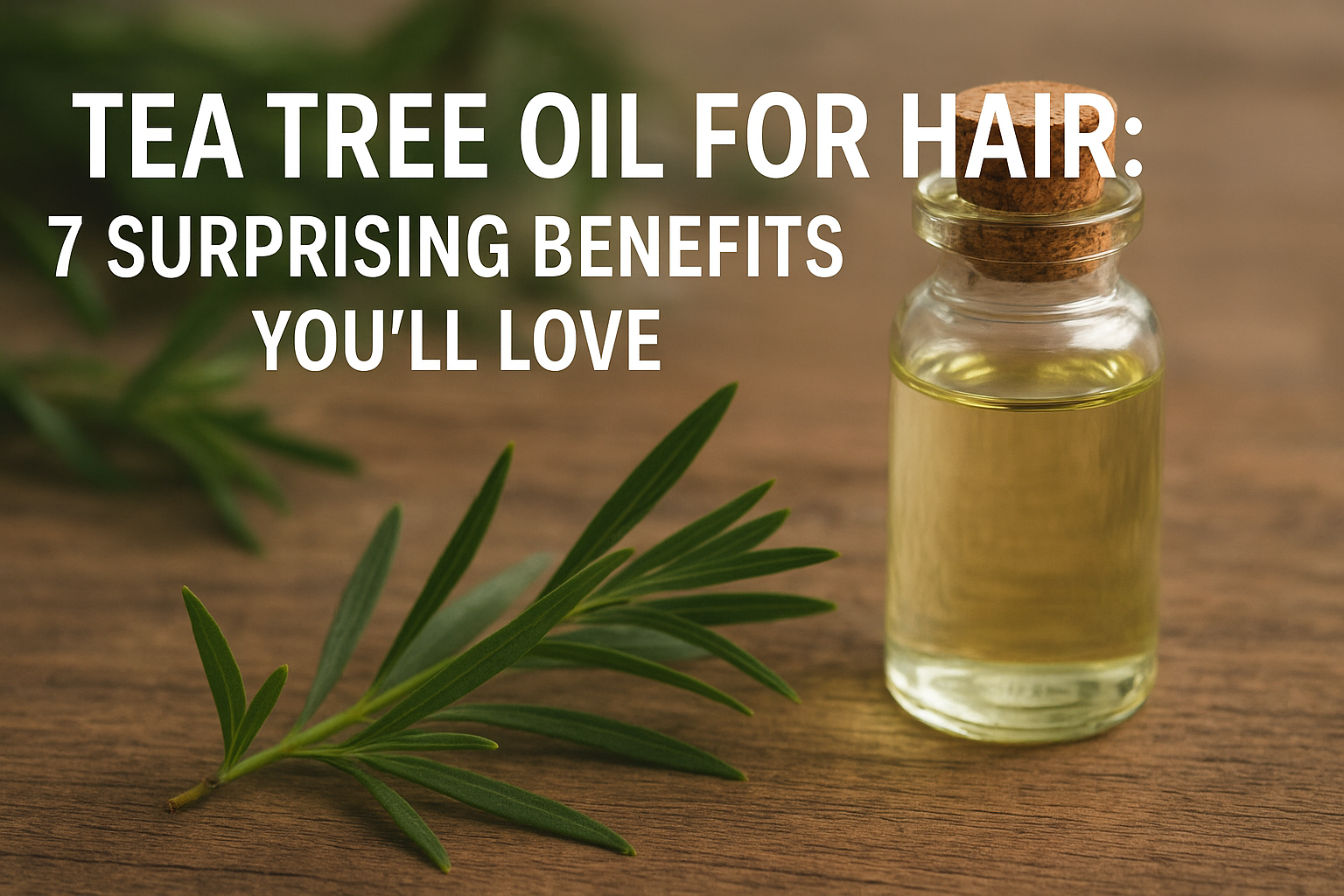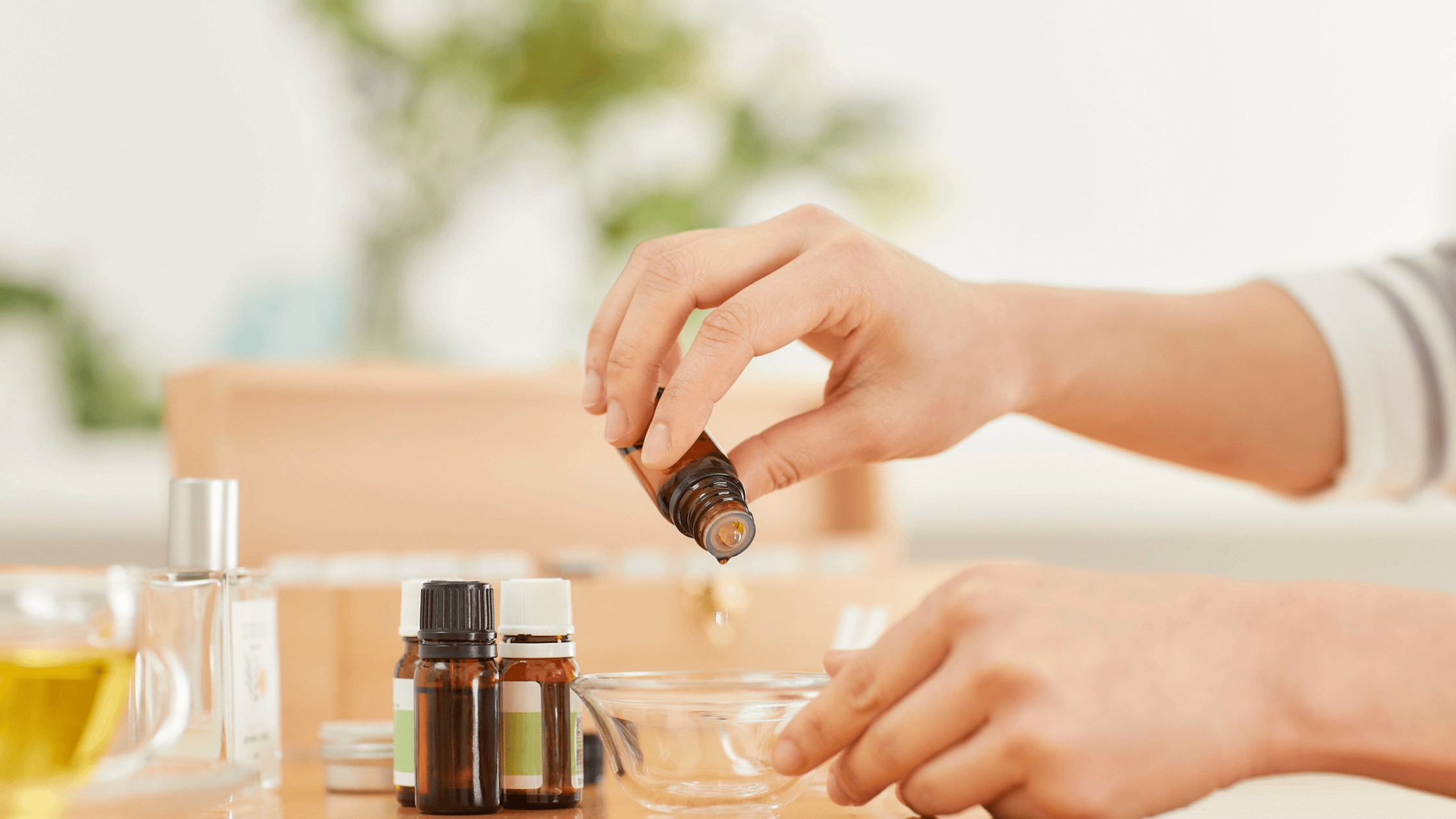
🌿Tea Tree Oil for Hair: 7 Surprising Benefits You’ll Love
If you’re struggling with dandruff, itchy scalp, or thinning hair, nature might already have the answer — and it’s called tea tree oil. Extracted from the leaves of the Australian Melaleuca alternifolia tree, this potent essential oil has been used for centuries to treat various skin and scalp issues.
Today, tea tree oil is making waves in the world of hair care — not just for its soothing properties, but for its proven benefits in promoting scalp health and hair growth. In this article, we’ll dive into 7 powerful reasons to use tea tree oil for hair, how to use it safely, a weekly routine, and scientific research backing its effectiveness.
What is Tea Tree Oil?
Origins and Composition
Tea tree oil, also known as melaleuca oil, is a volatile essential oil known for its antibacterial, antifungal, and anti-inflammatory properties. It’s commonly extracted through steam distillation of tea tree leaves.
Why It’s Used in Hair Care
Its ability to deeply cleanse, soothe irritation, and restore scalp balance has made it a favorite in shampoos, serums, and DIY hair treatments. Unlike chemical-based products, tea tree oil works gently yet effectively, making it a natural go-to for scalp care.
Global Hair Problems: Shocking Stats You Should Know
 Amazing Benefits of Tea Tree Oil for Hair
Amazing Benefits of Tea Tree Oil for Hair
1. Fights Dandruff Naturally
Dandruff is often caused by fungal overgrowth or dry scalp. Tea tree oil’s antifungal properties help combat Malassezia, the yeast-like fungus associated with dandruff. A study published in the Journal of the American Academy of Dermatology showed that using a 5% tea tree oil shampoo reduced dandruff by 41% after just four weeks.
2. Reduces Itchy and Dry Scalp
The anti-inflammatory and moisturizing properties of tea tree oil relieve itchiness and flakiness without stripping the scalp of its natural oils. Regular use can soothe irritation and leave your scalp feeling refreshed.
3. Promotes Hair Growth
While Tea Tree Oil for Hair may not directly stimulate hair follicles, it plays a vital role in creating the ideal environment for growth. By deeply cleansing the scalp, reducing buildup, and soothing inflammation, it helps maintain a healthy, nourished scalp. This foundation is essential for strong, long, and healthy hair to thrive—free from blockages and irritation.
4. Unclogs Hair Follicles
Blocked hair follicles, often due to product buildup or excess oil, can stunt hair growth. Tea tree oil acts as a natural cleanser that removes impurities and unclogs follicles, helping hair breathe and grow freely.
5. Prevents Oily Scalp
If your scalp is too oily, it can attract dirt and lead to clogged pores. Tea tree oil balances sebum (oil) production, keeping the scalp clean without over-drying it.
6. Soothes Scalp Inflammation
Whether due to psoriasis, eczema, or general irritation, tea tree oil can reduce redness and inflammation. Its calming effect soothes even sensitive scalps.
7. Strengthens Hair Roots
By enhancing blood circulation and reducing inflammation, tea tree oil may help improve the strength of hair roots, reducing hair fall over time.
📅 Weekly Tea Tree Oil For Hair Care Routine (Table)
| Day | Usage Type | Instructions |
|---|---|---|
| Monday | Scalp Massage | Mix tea tree oil with coconut oil and massage into the scalp. Leave for 30 mins before rinsing. |
| Tuesday | Rest | No application. Let your scalp rest and breathe. |
| Wednesday | Shampoo | Add 5 drops of tea tree oil to your shampoo. Leave on scalp for 2–3 minutes before rinsing. |
| Thursday | Rest | No application. Optional: Apply light oil if scalp feels dry. |
| Friday | Hair Mask | Apply a mask of tea tree oil + aloe vera + coconut oil. Leave for 20–30 mins and wash off. |
| Saturday | Final Rinse | Rinse hair with warm water mixed with 3 drops of tea tree oil and a mug of water. |
| Sunday | Rest / Hydration | Rest day or apply light aloe vera or coconut oil for hydration. |

How to Use Tea Tree Oil for Hair Care
1. Dilution with Carrier Oils
Mix 2-3 drops of tea tree oil with a tablespoon of carrier oil like coconut, jojoba, or olive oil. Massage into your scalp and leave for 30 minutes before rinsing. This improves circulation and soothes irritation.
2. DIY Tea Tree Oil Hair Mask
Ingredients:
2 tsp coconut oil
2 tsp aloe vera gel
3 drops tea tree oil
Steps:
Mix all ingredients, apply to scalp and roots, leave for 20–30 minutes, and shampoo as usual.
3. Add to Shampoo
Simply add a few drops of tea tree oil to your regular shampoo before applying it to your scalp. Leave it on for 2–3 minutes for the oil to work its magic.
🧬 Scientific Studies and Research
Backed by science, tea tree oil isn’t just a home remedy — it’s clinically recognized:
1. Tea Tree Oil for hair Dandruff – 2002 JAAD Clinical Trial
A randomized study published in the Journal of the American Academy of Dermatology (JAAD) in 2002 found that participants using a 5% tea tree oil shampoo for 4 weeks saw a 41% improvement in dandruff, itchiness, and greasiness compared to placebo.
📚 Source: PubMed – 2002 JAAD Tea Tree Oil Study
🟢 Internal Link Suggestion:
👉 How Tea Tree Oil Shampoo Naturally Fights Dandruff Without Chemicals2. Antifungal Properties – 2013 Phytotherapy Research
In 2013, Phytotherapy Research published a paper confirming tea tree oil’s antifungal action against Malassezia furfur, a yeast species commonly linked with dandruff and seborrheic dermatitis.
📚 Source: Wiley – Tea Tree Oil Antifungal Study
🟢 Internal Link Suggestion:
👉 Why Tea Tree Oil is Your Scalp’s Best Friend Against Fungal Build-Up3. Anti-inflammatory Benefits – Skin Pharmacology & Physiology
A study from Skin Pharmacology and Physiology confirmed the anti-inflammatory effects of Tea Tree Oil for Hair and scalp use, highlighting its potential to calm flare-ups caused by psoriasis and eczema.
📚 Source: Karger – Tea Tree Oil Anti-inflammatory Study
🟢 Internal Link Suggestion:
👉 Tea Tree Oil for Sensitive Scalps: Science Behind the Soothing Power
Precautions and Side Effects
While tea tree oil is natural, it’s highly concentrated and should be handled with care:
✅ Always dilute before applying to your scalp. Never use it directly.
✅ Do a patch test before first-time use to avoid allergic reactions.
❌ Avoid contact with eyes and mouth.
❌ Do not ingest.
Pregnant women and children should consult a doctor before using essential oils.
Final Thoughts – Should You Try Tea Tree Oil for Hair?
If you’re searching for a natural remedy to boost your scalp health and improve hair quality, tea tree oil is worth trying. Backed by research and centuries of use, it offers a holistic way to fight dandruff, stimulate the scalp, and restore balance.
Tea tree oil’s antifungal properties make it excellent for scalp health. Rosemary oil offers similar benefits, especially for hair growth.
Just remember — consistency is key, and a little goes a long way. With the right routine and proper dilution, tea tree oil can become a powerful ally in your hair care journey.
Want to explore more natural hair solutions? Check out our detailed guide on Rosemary Oil for Hair.
About The Author
Supriya Pal | Essential Oil Expert
Published on: July 30, 2025
Supriya Pal is the founder of GrowEssential.in, a trusted platform delivering science-backed insights, tips, and holistic advice on essential oils. With a passion for natural wellness and years of research, Supriya empowers readers to make smart, health-focused decisions every day.

 Amazing Benefits of Tea Tree Oil for Hair
Amazing Benefits of Tea Tree Oil for Hair